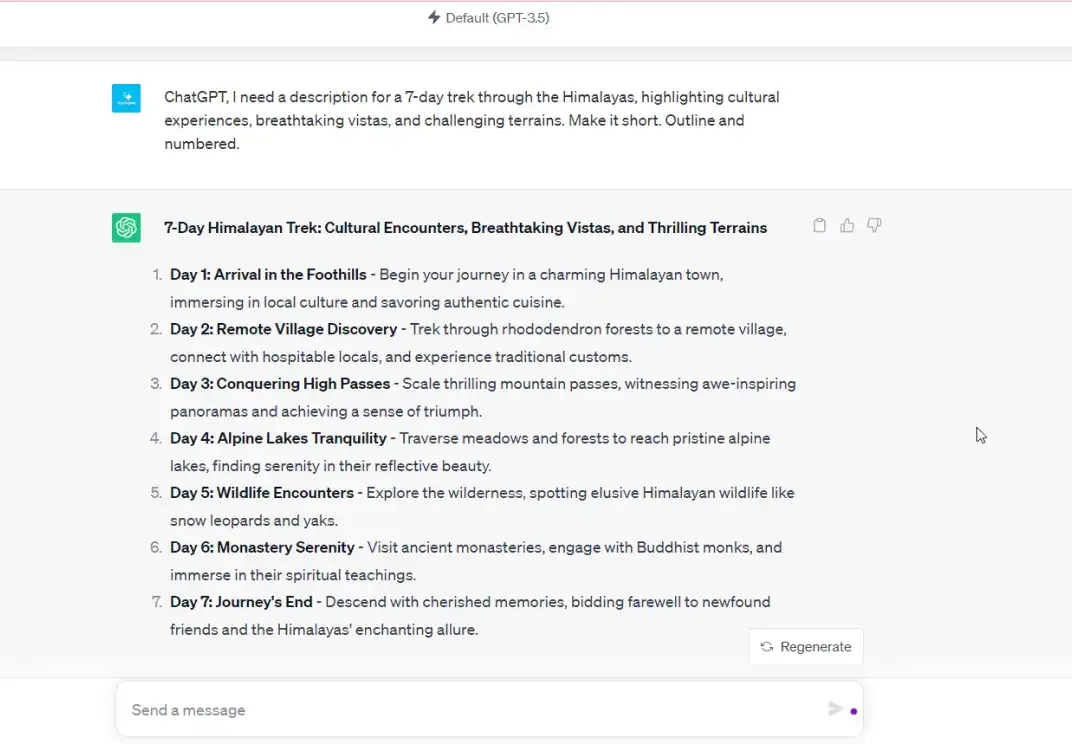Imagine a world where planning a vacation is as easy as chatting with a friend. A world where you receive personalized, accurate recommendations at lightning speed.
Well, this is no longer a distant dream, but a reality thanks to the advent of artificial intelligence (AI) in the travel industry.
One tool that stands out in this revolution is the generative pre-trained transformer, ChatGPT, in the travel industry, which has shown immense potential to transform travel businesses and the way we travel.
Short Summary
- ChatGPT is a language model which can revolutionize the travel industry by providing personalized experiences and automating processes.
- AI tools such as ChatGPT enable tour operators to offer personalized itineraries, efficient customer support, cost savings through data-driven decisions, streamlined booking process and tailored marketing campaigns.
- Concerns about accuracy of information must be addressed in order to achieve successful balance between automation & personalization for an optimal user experience.
How ChatGPT is Paving the Way in the Travel and Tourism Sector

Introducing ChatGPT by OpenAI: a state-of-the-art language model employing advanced machine learning to craft text that's remarkably human in nature. When we look at the travel and tourism world, ChatGPT is more than just a tool; it's a game-changer, presenting possibilities we once only dreamed of.
In our modern, digital-driven era, travelers aren't simply looking for information. They seek swift responses, pinpoint accuracy, and a touch of personalization in their experiences. Let's delve deeper:
- Booking Made Simple: With ChatGPT, the reservation and booking processes aren't just more efficient; they're transformed. Travel agencies can achieve better results, faster.
- Customized Suggestions: Each traveler is unique. Recognizing this, ChatGPT offers travel advice tailored to individual preferences, making every journey feel one-of-a-kind.
- Unearth New Destinations: Why settle for the familiar? ChatGPT introduces travelers to lesser-known spots, providing a fresh take on exploration.
For the hardworking tour and activity operators out there, there's even more in store. Integrating ChatGPT means you can offer continuous customer service, design itineraries that resonate on a personal level, and harness the power of data-driven decision-making. All in all, ensuring every traveler's experience is nothing short of exceptional.
Elevating the Tour Experience with AI

While travelers bask in the wonders of ChatGPT, the true magic brews behind the scenes with the orchestrators of these journeys - the tour operators.
Through ChatGPT, tour operators aren't just offering trips, they're crafting experiences. This means tailor-made itineraries, top-notch customer service, and choices backed by insightful data.
Integrating such AI marvels isn't just about redefining the customer journey. Really, it’s also a strategic move that optimizes operational costs, allowing businesses to channel human resources more effectively.
Here are some ways on how ChatGPT technology can improve your business!
Crafting Enchanting Tour Descriptions with ChatGPT
Creating alluring descriptions for the tours you offer can mean the difference between a potential traveler clicking “Book Now” or navigating away.
Here's how tour operators can harness the prowess of ChatGPT to write captivating tour descriptions and ensure they're accurate.
- Set the Scene: Begin by providing ChatGPT with some basic details about the tour. For instance: "ChatGPT, I need a description for a 7-day trek through the Himalayas, highlighting cultural experiences, breathtaking vistas, and challenging terrains."

- Expand and Refine: Use the generated content as a starting point. If you need more specificity or a different tone, ask follow-up questions or provide additional details: "Can you emphasize the sunrise view from the peak on day 5?" or "Highlight the experience of staying with local families."
- Incorporate FAQs: Potential travelers will have questions. Use ChatGPT to anticipate and answer these in the description: "What are common questions travelers have about Himalayan treks?"

- Fact-Check: This is paramount. While ChatGPT is knowledgeable, it's essential to ensure all details in the description – from trek durations to amenities and cultural experiences – align with the actual tour offering. Cross-referencing with on-ground details, previous traveler feedback, and current offerings guarantees accuracy.
Efficient Customer Support
In the digital age of the travel realm, exceptional customer support is essential. Addressing travelers' concerns promptly and effectively makes all the difference in customer satisfaction levels. Yet, considering the influx of daily inquiries, staying consistently efficient is challenging.
That's where ChatGPT shines.
Once you integrate ChatGPT in your website as a chatbot, you can now offer swift responses and minimal wait times. Envision an ever-available travel assistant handling multiple requests at once.
From booking questions to tailored recommendations or addressing feedback, ChatGPT steps up, enhancing both service quality and the overall traveler experience.
Personalized Itineraries with ChatGPT
Personalization is more than just a buzzword; it's becoming a standard in the travel industry. For tour operators aiming to stand out and truly cater to their travelers' unique preferences, ChatGPT is a game-changer.
Here's how tour operators can harness this AI tool to create tailored itineraries on their booking platforms:
- Engaging Chat Prompts: Integrate ChatGPT on your booking site, where it initiates a friendly chat. "Looking for an adventure or a relaxed getaway?" Such prompts can help gather insights into a traveler's desires.
- Deep Dive with Dynamic Questions: As travelers engage with ChatGPT, the AI can ask deeper, dynamic questions based on previous answers, creating a virtual conversation. For example, if a traveler expresses interest in history, ChatGPT might delve into specifics: ancient ruins, museums, or historical performances?
ChatGPT's Impact on Online Travel Agencies

In the ever-evolving digital landscape of travel, OTAs are on a perpetual quest for cutting-edge travel technology, to up their game and stand out.
Be it a customer scrambling to find a last-minute flight deal, an adventurer hunting for unique travel recommendations, or an a travel agent, sifting through customer feedback for insights, ChatGPT has the prowess to manage these tasks seamlessly, and then some.
Streamlined Booking Process
In the world of online travel, a streamlined booking process is critical in enhancing user experience and securing more bookings. ChatGPT can play a significant role in this aspect by automating booking processes.
Let's say a customer is looking to book a hotel for their upcoming vacation. Rather than manually searching through numerous options, the customer can simply input their preferences into the OTA’s chat box powered by ChatGPT.
Within seconds, they receive a list of top hotels everywhere that match their preferences, along with the option to book immediately. Such a streamlined booking process not only saves time for the customer, but also increases the chances of securing a booking for the OTA.
Tailored Marketing Campaigns
In today’s competitive market, personalized marketing campaigns are key to capturing the attention of customers and driving engagement. For OTAs, creating such campaigns can be a time-consuming and resource-intensive task.
However, with ChatGPT, this process can be significantly simplified.
By analyzing customer data, ChatGPT can generate personalized marketing content, itinerary building capabilities, self service, tailored to the interests and preferences of each customer.
For instance, if a customer frequently books beach vacations, the OTA can use ChatGPT to generate marketing content that highlights special deals on beach resorts, new beach destinations to explore, and tips for a perfect beach vacation.
Such tailored campaigns not only resonate more with customers, but also increase the likelihood of conversions.
Enhanced User Experience
An enhanced customer experience is the ultimate goal for any OTA. A satisfied customer is more likely to return and recommend the service to others. ChatGPT can play a crucial role in enhancing the user experience on travel websites.
By providing real-time assistance and personalized recommendations, ChatGPT can help customers navigate through the plethora of travel options and make informed decisions.
Whether it’s a question about baggage policies, a request for the best vegan restaurants in a city, or a last-minute change in delayed flight booking, ChatGPT is capable of providing quick and accurate responses, with real time data ensuring a smooth and enjoyable customer experience.
Collaboration Between AI Tools and Travel Agents

While AI tools like ChatGPT can automate many processes in the travel industry, the role of human expertise cannot be undermined. A successful implementation of AI in the travel industry involves a harmonious collaboration between AI tools and travel agents.
ChatGPT, with its ability to handle routine tasks, allows travel agents to focus on more complex issues that require human intervention.
At the same time, it is capable of continual learning and improvement, making it a valuable ally for travel agents in their quest to provide the best possible service to their customers.
Complementing Human Expertise
In the travel industry, human expertise plays a critical role. From understanding nuanced and customer expectations and preferences to dealing with complex situations, human travel agents bring a level of understanding and flexibility that is currently unmatched by AI.
However, that doesn’t mean AI and human agents can’t work together. In fact, they can complement each other remarkably well, especially when it comes to processing and interpreting human language.
ChatGPT can enhance the productivity of travel agents by:
- Handling routine tasks
- Freeing up valuable time
- Allowing agents to focus on tasks that require human expertise, such as offering customized advice and recommendations to customers
In this way, ChatGPT ensures a high level of customer service while maximizing the efficiency of travel agents.
Continuous Learning and Improvement
One of the most remarkable features of AI tools like ChatGPT is their ability for continuous learning and improvement. By analyzing user interactions and feedback, ChatGPT can refine its performance over time, delivering more accurate and relevant information to users.
Imagine a scenario where a customer is dissatisfied with the hotel recommendations provided by ChatGPT. The customer provides feedback, stating their preference for boutique hotels over chain hotels.
ChatGPT takes this feedback into account, and the next time the customer asks for hotel recommendations in specific city, it suggests a list of top-rated boutique hotels in the desired location.
This ability for continuous improvement not only enhances the performance of ChatGPT but also leads to higher customer satisfaction.
Real-World Applications of ChatGPT in the Travel Industry
While the potential of ChatGPT in the travel industry is vast, it’s important to move beyond theory and look at real-world applications. Many travel companies have already started integrating ChatGPT into their services to provide a better user experience.
Notable examples of ChatGPT’s implementation in the travel industry include Expedia’s Trip Board and Kayak’s AI-Powered Travel Assistant.
From providing personalized trip planning and hotel recommendations through virtual agents to offering tailored advice on travel destinations based on extensive travel data, these implementations showcase the transformative potential of ChatGPT in the travel industry.
Expedia Trip Board Planner
Expedia, a leading player in the travel industry, has harnessed the power of ChatGPT to elevate its trip planning experience. The Expedia Trip Board Planner is designed to assist families and groups of friends in selecting the ideal place to stay, acting as a hub for all aspects of trip planning.

By leveraging ChatGPT, the Expedia app provides personalized trip planning and hotel recommendations through its mobile app.
This means that users can simply input their preferences and receive a tailored list of hotel options, activities, and flights, making the trip planning process as easy as chatting with a friend.
Kayak's AI-Powered Travel Assistant

Another impressive real-world application of ChatGPT is Kayak’s AI-Powered Travel Assistant. This virtual assistant uses integrated ChatGPT to analyze customer feedback and provide personalized advice and recommendations to customers.
By leveraging Kayak’s extensive travel data, ChatGPT can offer suggestions that are tailored to each customer’s unique preferences and needs.
Whether it’s a family looking to explore trip ideas or for the best kid-friendly destinations, a couple seeking a romantic getaway, or a solo traveler in search of an adventure, Kayak’s AI-Powered Travel Assistant can provide tailored advice that enhances the travel planning process.
Addressing Concerns and Limitations of ChatGPT
While the potential of ChatGPT in the travel industry is undeniable, it’s important to address the concerns and limitations associated with this new technology.
ChatGPT, like any AI tool, is not without its shortcomings. It is not capable of replicating the cognitive abilities of a human, nor can it generate novel ideas or insights from its existing knowledge base.
Moreover, while ChatGPT can automate many processes, it’s crucial to maintain a balance between automation and personalization. The use of AI should not replace the human touch, but rather complement it, to provide a unique and personalized experience to customers.
Ensuring Accurate Information
One of the major concerns with AI tools like ChatGPT is the accuracy of the information provided. Ensuring the use of relevant data can help mitigate issues such as customer dissatisfaction, financial losses, and damage to the company’s reputation.
To ensure the accuracy of the information provided by ChatGPT, travel companies can implement a combination of manual and automated verification processes, as well as third-party verification services. This way, they can make the best use of AI while ensuring the accuracy and reliability of the information provided to their customers.
Balancing Automation and Personalization
As artificial intelligence becomes more integrated into the travel industry, it’s crucial to strike a balance between automation and personalization. While AI can automate routine tasks and provide quick responses, the personal touch that comes from human interaction is what often makes a travel experience truly memorable.
Automated personalization, where AI is used to tailor offers or messages to each customer's journey based on their profile, can enhance customer engagement and optimize performance. However, maintaining a human touch in the form of personalized advice and human involvement in complex decisions can ensure that the travel experience remains unique and satisfying for each customer.
Summary
To wrap things up, the fusion of AI with the travel realm, especially with powerhouses like ChatGPT, is reshaping our travel narratives. Think custom-crafted journeys, swift support, seamless online bookings through, and pinpointed marketing — that's AI working its magic!
Looking ahead, this harmonious blend of AI intelligence and human touch isn't just the trend; it's the blueprint. It's set to craft unparalleled, memorable travel stories for globetrotters everywhere.
Frequently Asked Questions
Can I use ChatGPT to plan a trip?
Yes, you can use ChatGPT to plan a trip. It has itinerary building capabilities with recommendations for activities, restaurants, and transportation.
What is travel chatbot?
Travel chatbots are virtual customer service agents that provide 24/7 assistance and support with inquiries, bookings, and travel information. They enable a more efficient and convenient journey for customers.
Chatbots are becoming increasingly popular in the travel industry, as they provide a more personalized and efficient customer experience. They can answer questions quickly and accurately, provide personalized recommendations, and even book flights and hotels.
What is ChatGPT and what is its potential in the travel industry?
ChatGPT is a revolutionary Artificial Intelligence language model with the potential to significantly improve customer experiences, automate processes and provide insightful data in the travel industry.
It can be used to generate natural language responses to customer inquiries, automate customer service tasks, and provide data-driven insights into customer behavior.
ChatGPT is a powerful tool that can help travel companies increase efficiency and reduce costs.
How does ChatGPT facilitate personalized itineraries?
ChatGPT facilitates personalized itineraries by allowing customers to create plans based on their individual preferences, helping ensure a more enjoyable and satisfying travel experience.
By leveraging the power of artificial intelligence, ChatGPT can quickly generate personalized itineraries that are tailored to each customer’s individual needs and preferences. This makes it easier for customers to find the perfect destination and plan their trip in a timely manner.
What is the impact of ChatGPT on online travel agencies?
ChatGPT has been a major asset for online travel agencies, enabling them to streamline the booking process, customize marketing campaigns, and improve user experiences.





